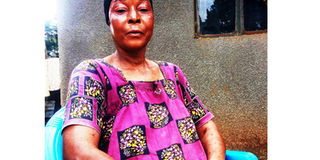Skin bleaching: Nakalisa’s biggest regret in life

Nakalisa explains her ordeal. PHOTO BY MOSES MUWULYA.
What you need to know:
Aisha Nakalisa likens the bleaching addiction to a cigarette smoker, who starts slowly and later get obsessed with smoking writes Moses Muwulya
If there is anything to regret in life, Aisha Nakalisa, hardly skips the day she chose to bleach her skin, in a quest for a lighter complexion to attain what she perceived as beauty.
With sour grief painted on her dry pale face, the 47-year old, shares that the day she started bleaching her skin, lured by her spouse, is cemented on her heart.
Unfortunately, the mother of five, who resides in Kimannya, a Masaka Town suburb, vividly recalls the very date for sad reasons, because the decision she took, later drowned her in a pool of shame and stigma.
“I started bleaching in 1990, after my spouse lured me into it. He wanted me to look lighter, and tirelessly bought me the needed cosmetics, to have his wife stunningly beautiful,” the mother of five recounts.
Since she also wanted to be attractive to her spouse, she explains that she had to bow to her sweetheart’s desire, to guarantee a lasting relationship.
In pursuit of beauty, she used a number of cosmetics which her husband brought.
“When you smear such creams in the face, it spreads to the rest of the body,” she shares as she shows me her lightened back yet she could not easily have it smeared there.
These, she says, worked for her. “I was a good looking and beautiful lady of that time (1990s) walking with a lot of swagger. Everyone would talk about my looks which excited my husband.”
But what started slowly, later became an addiction. She was never comfortable whenever she saw women who were lighter than her. “My instinct told me that because my spouse fancied light skinned ladies, he could drop me and go with them”
Thus Nakalisa continued craving a lighter complexion and did everything possible to keep herself at the same level with them, by bleaching more and more to keep her man.
She equates the bleaching addiction to a cigarette smoker, who starts slowly and later gets obsessed with smoking, saying it is exactly how most of ladies start the bleaching syndrome. “Okweyelusa gulinga muzimu,bwekukukwata togwejako.”
“I eventually became a skin lightening addict even after separating with my spouse after 10 years,” she recalls.
However, she is convinced that the products that her husband used to buy her in the 1990s, were of good quality and did no harm to her skin, even when she overdid it.
But she believes the trouble started after separating with him in early 2000s, which saw her resort to cheap cosmetics of substandard quality, leaving her skin ruined.
“I was just a housewife and my husband provided everything and with bleaching, you don’t do it once, you have to keep on applying the creams monthly to maintain the complexion”
This meant that she had to buy herself the cosmetics, but could not afford the originals products for they were expensive.
“At one time the soap I was using became scarce and I had to painfully part with Shs5,000 to buy it. In 2000 that was a lot of money.”
Consequently, Nakalisa is hesitant to disclose her age, because bleaching has made her look much older and left her with a multi-coloured skin, with red patches in the face, yellow on her arms and dark skin on her back. The skin on her knees, toes and finger joints failed to lighten and remained normal.
This has fetched her stigma and low self esteem. She regrets why she opted for bleaching yet she was naturally beautiful.
“Skin bleaching has brought me shame and stigma; I now try to cover most parts of my body to hide the damage done by the products which, I thought would enhance my beauty,” the mother said.
Whenever she steps out in the sun’s heat, she shares that she feels like she is being electrocuted. Her skin itches intensely causing her distress. According to dermatologists, this happens because her skin pigment that provides crucial protection against the sun’s rays by absorbing ultra-violet light was destroyed, by the chemicals in the bleaching creams especially mercury.
“The discomfort is what makes me regret my ill decision to bleach and the spouse who lured me into it left me years back,” she notes. She acknowledges that the effects are bitter, “I now look at ladies who reserved their dark skin and envy them. Black is beauty. I wish all women would know this. But it is hard to stop even when one is told of the grave dangers skin bleaching creams hold.”
According to Nakalisa, this indifference to the dangers of lightening, is enhanced by the society one lives in.” We largely regard dark ladies as ugly people, and thus crave for a lighter skin complexion with little or no regard on the grave effects.”
“If God helps me and my skin gets healed, I will never engage in such. I have even aged and have grandchildren moreover, sincerely what is it that I am still looking for?” She wonders.
The Village Health Team Member, says she would advise fellow women especially the young ones, to appreciate their dark skin colour and be proud of it, rather than think that they will get more appealing if they lighten it.
Nakalisa believes that the only way to end this bleaching syndrome, which is also slowly eating up men is when government raises, or even puts a total ban on sale of such products.




